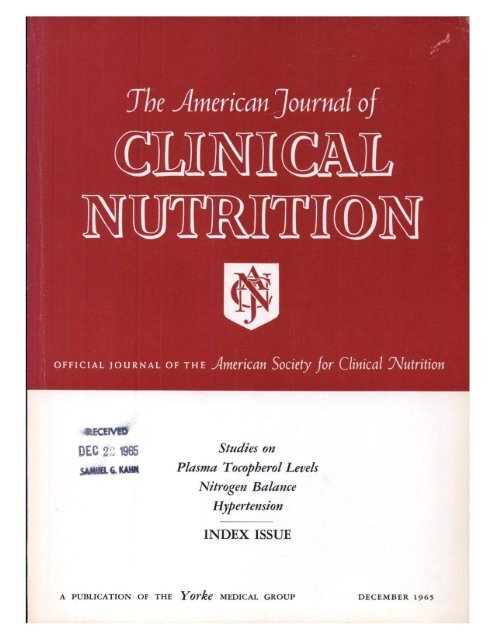多元文化健康饮食对认知能力下降和阿尔茨海默病风险的影响:一项中年成人随机对照试验
IF 6.5
1区 医学
Q1 NUTRITION & DIETETICS
引用次数: 0
摘要
背景:抗炎饮食模式与老年人认知能力下降较慢有关;然而,关于抗炎饮食模式对中年的影响,人们知之甚少。目的:使抗炎饮食适应多元文化环境,并评估其对健康中年人认知能力下降、阿尔茨海默病风险和相关痴呆的影响。方法:我们在成人(40-65岁;n=290),纽约布朗克斯。参与者被分配遵循多元文化健康饮食(MHD)、抗炎饮食或常规饮食(比较)。饮食是使用美国国家癌症研究所的自动自我管理24小时食物记录来评估的。主要认知结果在随机化后的9个月进行评估,使用由视觉空间记忆(网格记忆)、处理速度(符号搜索)和短期联想记忆结合(颜色形状)三个动态认知评估得出的整体综合评分。次要结果包括个体测试的表现和饮食成分与认知表现的关系。结果:在9个月的随访中,MHD组基于自我报告的饮食炎症指数(DII)得分较低,调整后的MHD减去比较差分别为-0.64 (95% CI: -1.02, -0.27)和-0.94 (95% CI: -1.34, -0.54),表明干预参与者坚持抗炎饮食模式。MHD组的小组会议和电话联络平均完成率分别为93%和72%。在主要结局——认知总体评分变化——与基线相比,两组间无统计学显著差异:-0.06 (95% CI: -0.15, 0.04), p=0.259。结论:MHD在这个多文化的美国队列中是可行和可接受的。虽然基于复合认知评分,9个月时MHD的影响不显著,但有必要使用其他测量方法进行额外的研究,如认知功能的日常变化和峰值表现。临床试验注册号:NCT03240406, https://clinicaltrials.gov/study/NCT03240406?term=Diet%20%26%20Cognition&page=3&rank=30。该协议可在此网站访问。本文章由计算机程序翻译,如有差异,请以英文原文为准。
The effects of the Multicultural Healthy Diet on cognitive decline and Alzheimer’s disease risk: a phase II randomized controlled trial in middle-aged adults
Background
Anti-inflammatory dietary patterns are associated with slower cognitive decline in older adults; however, little is known about the effects of an anti-inflammatory dietary pattern in middle age.
Objectives
This study aims to adapt an anti-inflammatory diet to a multicultural setting and assess its impact on cognitive decline and Alzheimer’s disease risk and related dementias in healthy middle-aged adults.
Methods
We performed a phase II pilot randomized clinical trial in adults (40–65 y old; n = 290) in Bronx, New York. Participants were assigned to follow either the Multicultural Healthy Diet (MHD), an anti-inflammatory diet, or usual diet (Comparison). Diet was evaluated using the National Cancer Institute’s Automated Self-Administered 24-h food records. The primary cognitive outcome was assessed at 9 mo after randomization using a global composite score derived from 3 ambulatory cognitive assessments of visuospatial memory (Grid Memory), processing speed (Symbol Search) and short-term associative memory binding (Color Shapes). Secondary outcomes included performance on individual tests and association of dietary components with cognitive performance.
Results
At 9-mo follow-up, the MHD arm had a lower Dietary Inflammatory Index (DII) score based on self-reported diet, with an adjusted MHD minus Comparison difference of –0.64 [95% confidence interval (CI): –1.02, –0.27] and –0.94 (95% CI: –1.34, –0.54) for the DII and energy-adjusted DII scores, respectively, indicating intervention participants had adhered to an anti-inflammatory dietary pattern. Group session and telephone contact completion averaged 93% and 72%, respectively, for the MHD arm. No statistically significant difference between arms was found in the primary outcome—cognitive global score change—from baseline: –0.06 (95% CI: –0.15, 0.04), P = .259.
Conclusions
The MHD is feasible and acceptable in this multicultural United States cohort. Although the influence of MHD at 9 mo is nonsignificant based on the global composite cognitive score, additional research using other measures such as day-to-day variability in cognitive function and peak performance is warranted.
This study was registered at clinicaltrials.gov as NCT03240406 (https://clinicaltrials.gov/study/NCT03240406?term=Diet%20%26%20Cognition&page=3&rank=30).
求助全文
通过发布文献求助,成功后即可免费获取论文全文。
去求助
来源期刊
CiteScore
12.40
自引率
4.20%
发文量
332
审稿时长
38 days
期刊介绍:
American Journal of Clinical Nutrition is recognized as the most highly rated peer-reviewed, primary research journal in nutrition and dietetics.It focuses on publishing the latest research on various topics in nutrition, including but not limited to obesity, vitamins and minerals, nutrition and disease, and energy metabolism.
Purpose:
The purpose of AJCN is to:
Publish original research studies relevant to human and clinical nutrition.
Consider well-controlled clinical studies describing scientific mechanisms, efficacy, and safety of dietary interventions in the context of disease prevention or health benefits.
Encourage public health and epidemiologic studies relevant to human nutrition.
Promote innovative investigations of nutritional questions employing epigenetic, genomic, proteomic, and metabolomic approaches.
Include solicited editorials, book reviews, solicited or unsolicited review articles, invited controversy position papers, and letters to the Editor related to prior AJCN articles.
Peer Review Process:
All submitted material with scientific content undergoes peer review by the Editors or their designees before acceptance for publication.

 求助内容:
求助内容: 应助结果提醒方式:
应助结果提醒方式:


